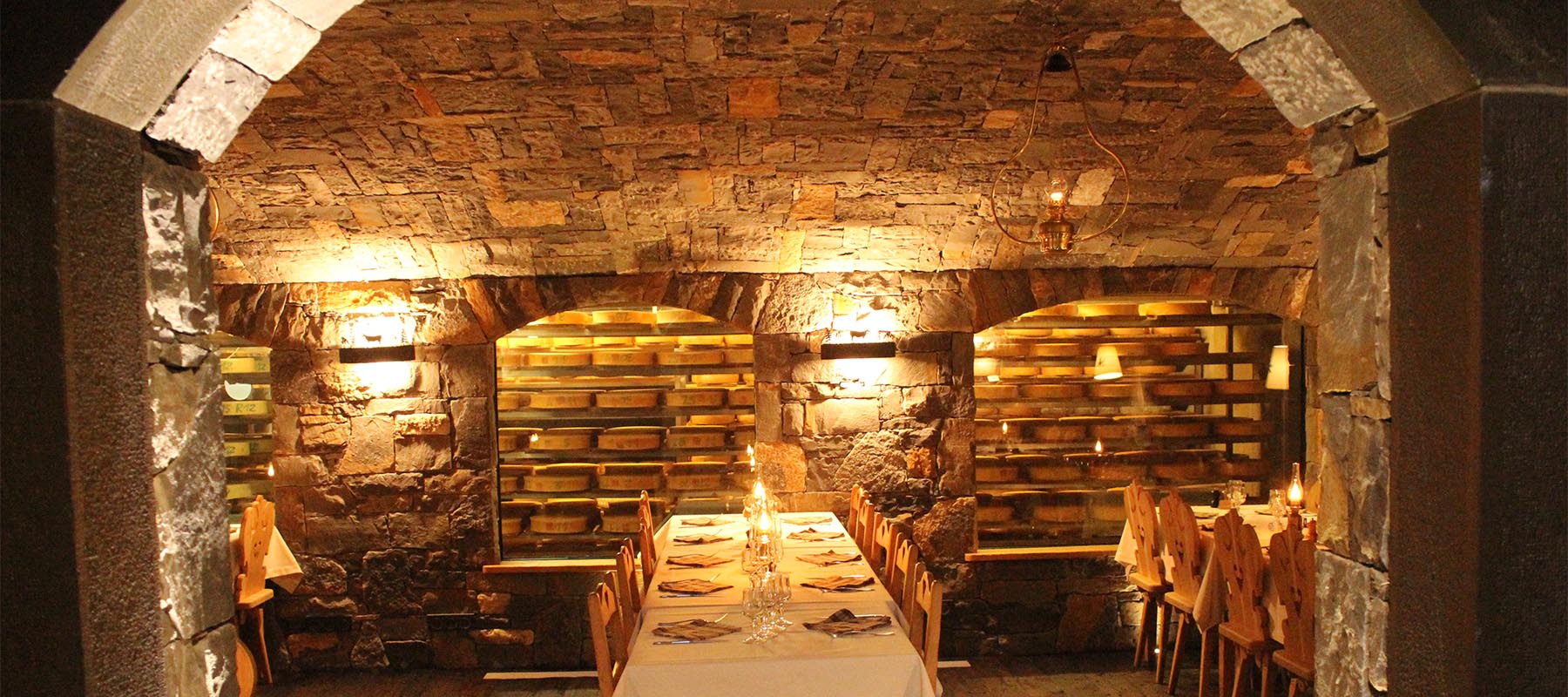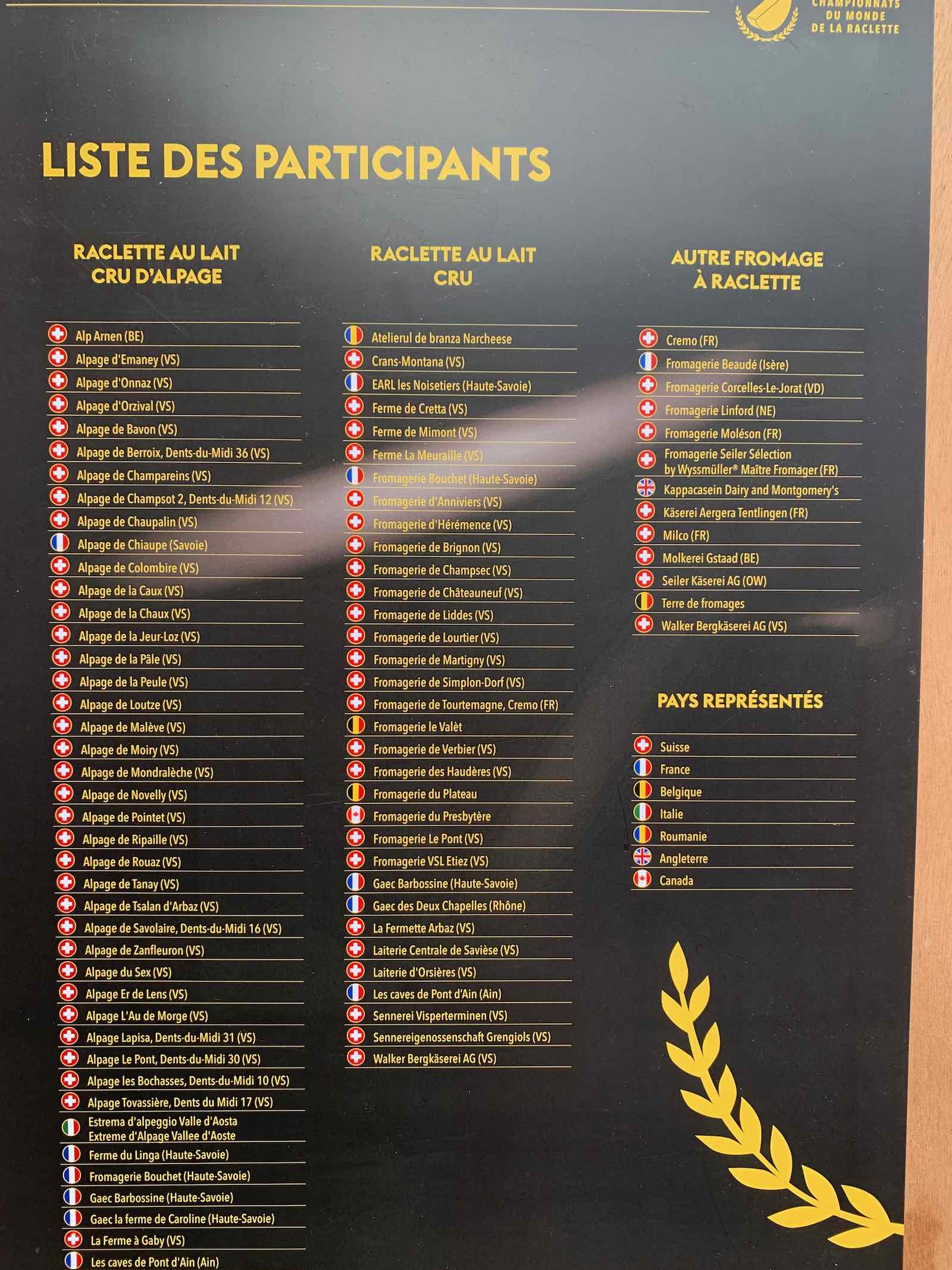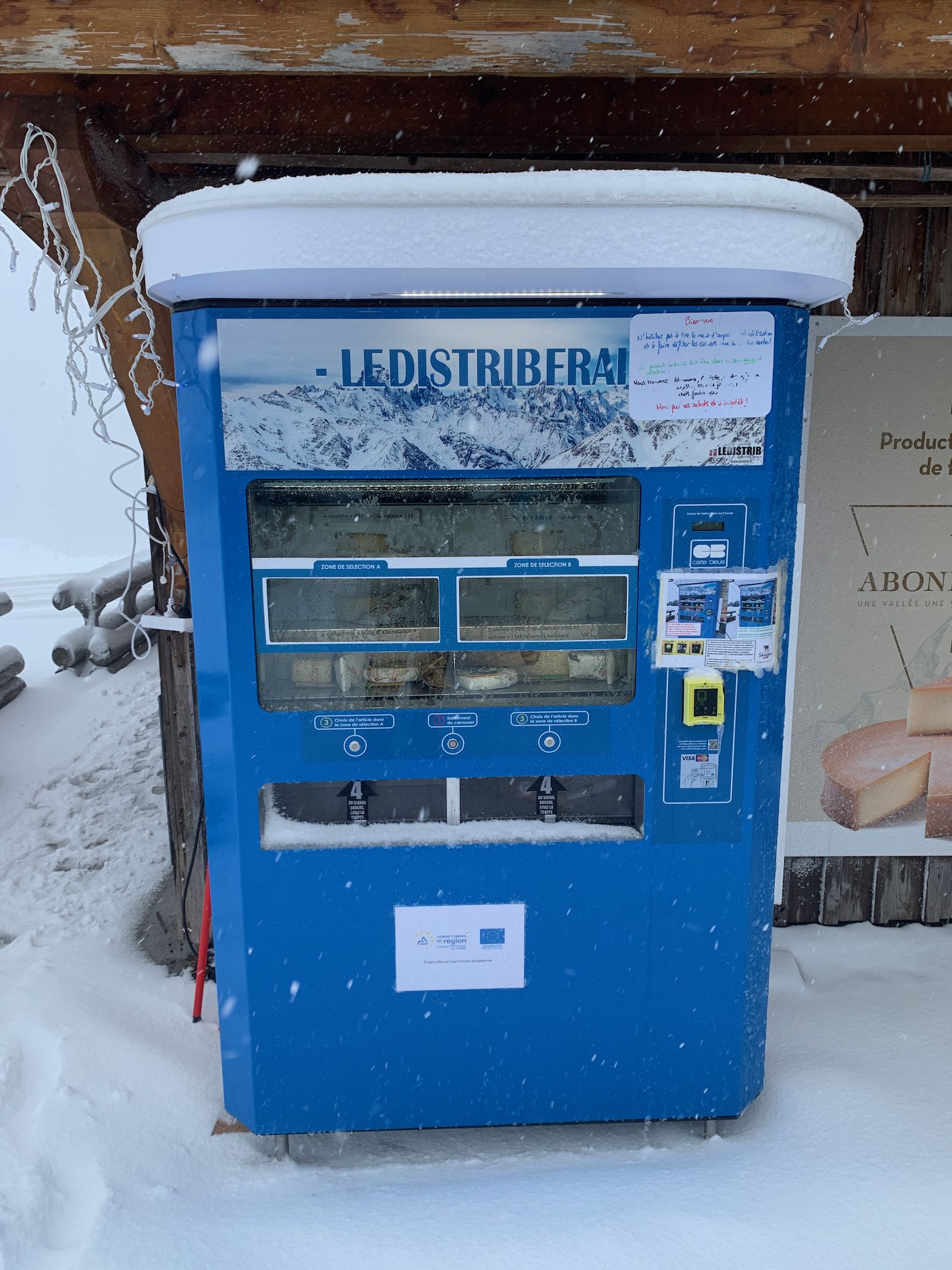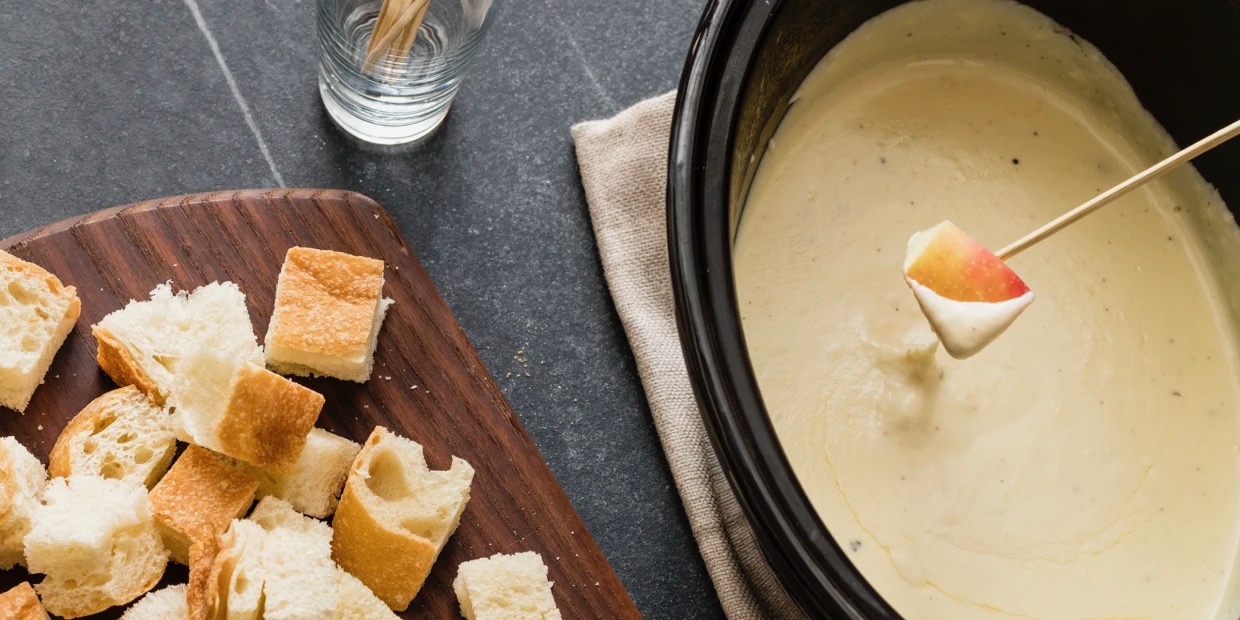A deep dive into cheese! It all started with a guest asking if we could serve more local cheese? And it turns out the answer is yes, however it also turns out that due to appellation controls there are only 5 cheeses that Morzine is allowed to produce.
In France cheese is mostly appellation controlled (AOP) meaning that certain cheeses can only be made in certain places with specific breeds of cow and methodologies. Geographically in Morzine we are allowed to make Abondance, Reblochon, Tomme De Savoie and Raclette (dairy cheeses) and Chevrotin (goats cheese).
Apart from being within the geographical areas farms also have to use the correct breed of cow. Abondance must be made with Abondance cows, these are brown cows that look like they are wearing sunglasses (they have brown rings around their eyes). Reblochon must be made with Tarine cows, light brown with black glasses and Montbeliade cows white with brown spots. Methodologies must be respected too, some dating back to the 1200s! For example Abondance must be made in copper cauldrons.
Morzine is home to several working farms that you can visit. As a rule of thumb the goat farms are a little easier to visit as goats require less space so are often closer to the villages whereas most of the dairy farms are slightly further out of town. Check opening times ahead of visiting as farm shops are often only open after farming times in the afternoon.
Local Goat farms
- Montriond. A beautiful recently constructed shop/barn to visit. Address: Opposite 1050 Route du Dravachet, Montriond
- Prodains. The Chevrerie des Ardoisieres goat farm is located a short walk from our chalets Grand Hibou and Atelier. Sweet little shop selling the best goat’s cheese raclette ever! You will feel a lot lighter after it compared to having a traditional raclette. Address.
- St Jean D’Aulps. La Clos Au Chèvre.
- Les Gets. La Ferme Du Caroline and Chevrerie Felires.
Local Dairy farms
- St Jean D’Aulps. La Ferme Du Caly. Great working farm with a shop on site selling cheese, milk, yoghurts and other farm products at great prices.
- Avoriaz. La Ferme de Serriachaux. A farm you can ski to! Also serves coffee and hot chocolate made with their own milk. And has a cheese vending machine!
- Essert Romand. La Touvière, Address.
- Nyon (ish) / Valley de la Manche. Ferme Boisier. Probably the longest queue in the market, owners of the Fréterolles farm from our in chalet guide books. You can’t visit here in the winter as it is under snow however you can catch them in the market every Wednesday. In Summer the farm where they graze their cows is a must to go and eat.
Morzine is also home to L’Alpage which is like a cooperative dairy where they make and sell cheese and offer an excellent free demonstration (in French), fascinating even if you don’t speak French.
Cheese combines some of our favourite things about Morzine: the history, the heritage and the year-round life. We have tried to capture it in our nightly cheese course, served with cheese stories! Since Morzine produces 5 cheeses we did consider serving just these on our catered chalet week-long stays cheese board however it would mean missing out on some other great cheeses so we settled on a cheese tour of the local area!

La Fruitière is the adjoining restaurant to L’Alpage cheese artisan in Morzine. Photo credit and restaurant link
Our cheese tour
Starting with the Jura mountains where our guests who fly into the foothills of Geneva airport arrive, Comte and Morbier. To our Morzine-produced cheese, Tomme.. Skiing you a little further around the ski area for Abondance. If you book our dine in you can also go full circle and back to where Raclette originates from, Switzerland.
Comte (semi hard dairy cheese) from the Jura mountains that slope down to Geneva Airport. The most popular Appellation cheese in France with 66,500 tonnes made annually apparently the average French person eats 26 Kg per year! 400 litres of milk are used to produce a wheel of 40 kg! Further Appellation controls include no more than 1.3 cows per hectare and that the cows are fed a natural diet, based on fresh grass in the summer and hay in winter, which strongly influences the diversity of the Comté flavours. Aged for at least 4 months, there are different vintages such as 12, 15, 18 months. Taste is mild and slightly sweet.
Morbier (semi soft dairy cheese) named after a small village in the same region as where Comte comes from. Distinctive because of the thin layer of ash that runs through the middle. Originally Morbier was made of a layer of evening milk curd when there was not enough to make an entire cheese. Cheesemakers would put the curd into a mold and put a layer of ash to protect it then the following morning it would be topped with a layer of morning curd. 11000 tonnes made per year. Aged for 45 days. Aromas of fruit, yoghurt, milky vanilla and even caramel pudding.
Tomme De Savoie (semi hard dairy cheese) One of the oldest of our regional cheeses. Traditionally local families made butter from milk curd and Tomme from milk whey, meaning Tomme is a lean cheese. 5800 tonnes are made per year. Matured for 30 days to 3 months.
Abondance (semi hard dairy cheese). A village that you can ski to in the Porte Du Soleil. 2860 tonnes made annually, ⅓ made by local farms the rest by local dairies. Made since the 14th century. Matured for at least 100 days on pine boards. Has a fruity taste with notes of pineapple, apricot, citrus and hazelnuts.
Available on our team night off, for dine in guests
Raclette (soft dairy cheese). Since the 11th century! Originally from the Valais in Switzerland, the country that we share our border with containing villages that you can ski to such as Champery, Champoussin, Morgins and Torgon. Farmers or shepherds would take bread /potatoes and a chunk of cheese for their evening meal when they took their herds up to the mountain pastures. They would light a fire at night, soften the cheese over the fire and scrape the melted cheese onto the potatoes, much as we do today! Traditionally served with wine to aid digestion 🙂 The name of the dish comes from racler, French to scrape. The dish has developed over the past 800 years to perfection, served with pickled vegetables such as cornichon and onions to cut through the cheese, potatoes and dried meats. Produced without flavouring or additives. 2300 tonnes per year. Matured for 8 weeks minimum on wooden boards
Brezian (soft dairy cheese). The name Brezain comes from the french word for ‘embers’, as it is slow smoked over beech and juniper wood, giving the cheese it’s characteristic golden amber hue and distinct flavour. Though it’s flavour evokes the spirit of a Savoie farmer’s fire in an old farmhouse, it is actually quite a new phenomenon! It was invented in just 1992 in Balme-de-Thuy near Lake Annecy, by a Breton who spent 6 years designing the cheese before manufacturing began (cheese designer is not the most common career path in France, but it is a career it seems!) and now more that 500 tonnes is produced a year! A fruity and smoky taste. It is perfect paired with a pinot noir or a local Ibex craft beer.
World Raclette Championships entrants!

Ingredients we use
Reblochon (soft dairy cheese). From the 13th century! The name means to milk again and refers to holding back from completely milking the cow. Tax was based on the amount of milk produced so dairy maids would hold some back. The retained milk matured by the time that the cow was re-milked so was too rich to drink but perfect to produce a cheese bearing the name of the process. 3,000 tonnes a year. Matured for 2-3 weeks and banned in the USA since 2004 since it is not ‘sufficiently aged’!
Fun facts we learned on route
La Ferme Du Gaby in Switzerland, which you can ski to, came 3rd place in the 2023 inaugural World Raclette Championships!
Not part of the AOP however, indicative of the care that goes in the cows are often given a first name following a French tradition of naming animals, sharing the same first letter of the year they were born. So for example 2023 in year U, so cows born this year will all begin with U!
There is a ski-by cheese vending machine at the Serriachaux farm in Avoriaz!

